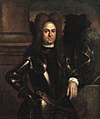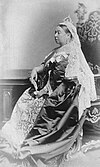Portal:British Empire/Selected biography
| This page is currently inactive and is retained for historical reference. Either the page is no longer relevant or consensus on its purpose has become unclear. To revive discussion, seek broader input via a forum such as the village pump. |
| Note: Article entries are now being transcluded directly on the main portal page. However, this page should be retained for historical reference. |
Selected biographies

These are selected biographies related to the British Empire which appear on Portal:British Empire.
Major General Roger Elliott (ca. 1665 - May 15, 1714) was one of the earliest British Governors of Gibraltar. His nephew George Augustus Eliott also became a noted Governor and defender of Gibraltar.
Roger Elliott was born, possibly in London but more probably in the Tangier Garrison in Morocco, to George Elliott (ca. 1636 - 1668, the Chirurgeon to the Garrison) and his wife Catherine Maxwell (ca. 1638 - 1709). George Elliott was the illegitimate son of Richard Eliot, the wayward second son of Sir John Eliot.
Roger's father, George Elliott, died at the Tangier Garrison in 1668 and his widowed mother remarried there on February 22, 1670 to Robert Spotswood (September 17, 1637 - 1680, the assistant and replacement Chirurgeon at the Garrison), and thirdly to Rev Dr George Mercer, the Garrison schoolmaster. Roger was therefore an older half-brother to Alexander Spotswood (ca. 1676 - June 6, 1740), who would become a noted Lieutenant-Governor of Virginia. (more...)Col. Richard Clement Moody (February 13, 1813 in Barbados- March 31, 1887 in Bournemouth, England), was a Lieutenant-Governor, and later Governor, of the Falkland Islands, and the first Lieutenant-Governor of the Colony of British Columbia. While serving under this post, he selected the site of the new capital, New Westminster. Moody was also a Colonel in the Royal Engineers, and was the commander of the Columbia Detachment, the force that was brought to BC to establish British order during the Fraser Canyon Gold Rush. (more...)
Victoria (Alexandrina Victoria; 24 May 1819 – 22 January 1901) was the Queen of the United Kingdom of Great Britain and Ireland from 20 June 1837, and the first Empress of India from 1 May 1876, until her death on 22 January 1901. Her reign lasted 63 years and seven months, which made her the second longest reigning British monarch (after Elizabeth II).British monarch. In general, the period centred on her reign is known as the Victorian era.
The Victorian era was at the height of the Industrial Revolution, a period of significant social, economic, and technological progress in the United Kingdom. Victoria's reign was marked by a great expansion of the British Empire; during this period it reached its zenith, becoming the foremost Global Power of the time. (more...)James Broun-Ramsay, 1st Marquess of Dalhousie, KT, PC (April 22, 1812 – December 19, 1860) was a British statesman, and a colonial administrator in India.
Born in Dalhousie Castle, Scotland, he crowded into his relatively short life conspicuous public service in the United Kingdom, and established an unrivalled position among the master-builders of the Indian empire. Denounced on the eve of his death and to this day by some as having failed to notice the signs of the Indian Rebellion of 1857, and even having aggravated the crisis by his overbearing self-confidence, centralising activity, and reckless annexations. (more...)
Edward VIII (23 June 1894 – 28 May 1972) was King of Great Britain, Ireland, the British Dominions beyond the Seas, and Emperor of India from the death of his father, George V (1910–36), on 20 January 1936, until his abdication on 11 December 1936. He was the second monarch of the House of Windsor, his father having changed the name of the royal house from Saxe-Coburg and Gotha in 1917.
Only months into his reign, Edward forced a constitutional crisis by proposing marriage to the American divorcée Wallis Simpson. Although legally Edward could have married Mrs. Simpson and remained king, his various prime ministers opposed the marriage, arguing that the people would never accept her as queen. Edward knew that the ministry of British Prime Minister Stanley Baldwin would resign if the marriage went ahead; this could have dragged the King into a general election thus ruining irreparably his status as a politically neutral constitutional monarch. Rather than give up Mrs. Simpson, Edward chose to abdicate. He is one of the shortest-reigning monarchs in British history, and was never crowned. (more...)Admiral of the Fleet Louis Francis Albert Victor Nicholas George Mountbatten, 1st Earl Mountbatten of Burma, KG, GCB, OM, GCSI, GCIE, GCVO, DSO, PC (25 June 1900–27 August 1979) was a British admiral and statesman and an uncle of Prince Philip, Duke of Edinburgh. He was the last Viceroy and first Governor-General of independent India, and First Sea Lord, as was his father, Prince Louis of Battenberg. Mountbatten was assassinated by the Provisional Irish Republican Army (IRA), who planted a bomb in his boat at Mullaghmore, County Sligo in the Republic of Ireland. (more...)
David Livingstone (19 March 1813 – 1 May 1873) was a British Congregationalist pioneer medical missionary with the London Missionary Society and explorer in central Africa. He was the first European to see Mosi-oa-Tunya (Victoria Falls), to which he gave the English name in honour of his monarch, Queen Victoria. He is the subject of the meeting with H. M. Stanley, which gave rise to the popular quotation, "Dr Livingstone, I presume?"
Perhaps one of the most popular national heroes of the late-nineteenth century in Victorian Britain, Livingstone had a mythic status, which operated on a number of interconnected levels: that of Protestant missionary martyr, that of working-class "rags to riches" inspirational story, that of scientific investigator and explorer, that of imperial reformer, anti-slavery crusader and advocate of commercial empire.Joseph Rudyard Kipling (December 30, 1865–January 18, 1936) was an English author and poet, born in Bombay, British India, and best known for his works The Jungle Book (1894), The Second Jungle Book (1895), Just So Stories (1902), and Puck of Pook's Hill (1906); his novel, Kim (1901); his poems, including Mandalay (1890), Gunga Din (1890), If— (1910) and Ulster 1912 (1912); and his many short stories, including The Man Who Would Be King (1888) and the collections Life's Handicap (1891), The Day's Work (1898), and Plain Tales from the Hills (1888). He is regarded as a major "innovator in the art of the short story"; his children's books are enduring classics of children's literature; and his best works speak to a versatile and luminous narrative gift. (more...)
Cecil John Rhodes, PC (July 5, 1853 – March 26, 1902[1]) was an English-born businessman, mining magnate, and politician in South Africa. He was the founder of the diamond company De Beers, which today markets 40% of the world's rough diamonds and at one time marketed 90%. He was an ardent believer in colonialism and was the founder of the state of Rhodesia, which was named after him. Rhodesia, later Northern and Southern Rhodesia, eventually became Zambia and Zimbabwe respectively. He is also known today for the scholarship that bears his name. (more...)










